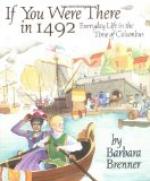The good Guacanagari was moved to tears by this sad affair. He gave not only sympathy, however, but assistance. His people went out with their canoes, and in a few moments cleared the vessel of all the goods in it. Guacanagari was very careful that nothing should be lost. He himself stood guard over the things which had been taken out of the ship. Then he sent comforting messages to the admiral, saying that he would give him what he had to make up for the loss. He put all the effects under shelter, and placed guards round them. The wrecker’s trade might flourish in Cornwall; but, like other crimes of civilization, it was unknown in St. Domingo. The admiral was evidently touched to the heart, as well he might be, by the kindness of these Indians. He thus expresses himself, “They are a loving, uncovetous people, so docile in all things, that I assure your highnesses I believe in all the world there is not a better people, or a better country; they love their neighbours as themselves, and they have the sweetest and gentlest way of talking in the world, and always with a smile.”
A colony founded.
The admiral resolved to found a colony in Guacanagari’s land, “having found such good will and such signs of gold.” In relating this, the Spanish historian, Herrera, makes some curious reflections. He looks upon the loss of the vessel as providential, in order that the true faith might be preached in that country. Then he says, how providence causes its work to be done, not on high motives only, but also on the ordinary ones which influence mankind. He concludes by observing that providence dealt with the Indians as a prudent father who has an ugly daughter, but makes up for her ugliness by the help of a large dowry. By the ugliness in this case he means the seas to be traversed, the hunger to be endured, and the labours to be undertaken, which he considers no other nation but the Spaniards would have encountered, even with the hope of greater booty.
With the timber of the unfortunate “Santa Maria” Columbus built a fort, and called it La Navidad, because he entered the port near there, on Christmas-day. He remained on very friendly terms with the good Cacique Guacanagari; and might have established himself most advantageously in that part of the country, if he could have been content, to be a settler.
The admiral returns.
But from the first moment of his discovery he doubtless had an anxious desire to get back to Spain, and to tell what he knew; and at times, perhaps, was fearful lest his grand secret, through some mischance to the expedition, should still perish with him. The great discoverer, therefore, now prepared to return homewards. He left his fort in trust to a small body of his followers,[12] whom he commended to the good offices of Guacanagari, not forgetting to impress upon them the excellent advice, to do no violence to man or woman, and, in short, to make their actions conformable to the idea (which the Indians first entertained of them) that they had come from heaven: then, having received the necessary provisions for his vessel from the friendly cacique, the admiral set sail for Spain on the 4th of January, 1493.




